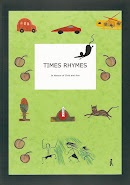If yesterday's radio could be filled with people saying what they think
. . . about what they think might have been said
. . . at a lecture
. . . they didn't attend
. . . on a subject about which they know nothing . . .
. . . why bother with events?
.
(On February 7th, The Archbishop of Canterbury delivered a paper entitled
'Civil and Religious Law in England: a religious perspective'
at the Royal Courts of Justice
in which he discussed the development of a relationship between British Law and Sharia.)
Subscribe to:
Post Comments (Atom)



5 comments:
There is real news out there I'm sure. Why so much time is spent on something so insignificant (religion) beggars belief.
I'm not sure this is about religion. Not really. The media are stirring things up on purpose and I can't see why.
If they had wanted to use the Archbishop's remarks to stimulate an interesting and useful debate - they could have done so.
Equally, nothing the Archbishop said need have been reported at all.
It is almost as if journalists are trying to stir up trouble. But I can't quite believe that.
Instead, I am wondering what 'real' news is being 'buried' over these last few days.
Susan
Too few people fought the evils of Nazism in the 1930s. The appeasers prevailed.
Like Nazism in the 1930s, medieval, backward, Jihadist, violent, bloodthirtsy Islamism is one of the great and growing evils of our time. Rowan Williams, the ayatollah of Canterbury, says that adopting parts of Sharia law seems unavoidable. He should be condemned for the appeaser he is.
Religion should be restricted to consenting adults in private. No religion – Islam, Judaism or Christianity – should have any bearing on the way parliament frames the laws of England.
The ayatollah himself is one of our law-makers. He sits in the House of Lords. He should be tossed out – along with the other priests who sit in our parliament only because of the priestly offices they hold.
Recent Muslim Law news
MUSLIM LAW 1) Guardian Unlimited, 5th February 2008.
“India's top tennis star, Sania Mirza, will boycott all tournaments in her home country this year after becoming embroiled in a series of off-court controversies, leaving millions of fans shocked and disappointed.
Mirza, 21, one of the country's most visible sporting faces, opted out of India's wealthiest event - the £300,000 Bangalore Open - next month. She told reporters it was becoming impossible to deal with the proliferating rows, many connected to her Muslim faith.
"At this moment, I have been advised by my manager not to play," she told reporters. "A lot has been happening in the last few months, every time I have played in India there has been some kind of problem so we just thought it was better not to play at this point."
The player has been criticised by Islamist groups for wearing short skirts on court, and recently had to apologise for filming an advert near a historic mosque in her home city of Hyderabad.
Mirza, Asia's highest-ranked singles player at No 29 in the women's rankings, has made it clear that she has even considered quitting the game because of the rows.
MUSLIM LAW 2) BBC News January 23rd 2008
An Afghan journalist has been sentenced to death by a provincial court for distributing "blasphemous" material.
Sayed Perwiz Kambakhsh, 23, was arrested in 2007 after downloading material from the internet relating to the role of women in Islamic societies.
A primary court in Balkh province said that Kambakhsh had confessed to blasphemy and had to be punished.
The court also threatened to arrest any reporters who protested against Kambakhsh's sentence.
Kambakhsh, a student at Balkh University and a journalist for Jahan-Naw (New World), was arrested in October 2007 after material he downloaded was deemed to be offensive to Islam.
Shamsur Rahman, the head of the court, told Reuters news agency: "According to... the Islamic law, Sayed Perwiz is sentenced to death at the first court.
"However, he will go through three more courts to declare his last punishment," he said.
MUSLIM LAW 3) BBC News February 9th 2008
Turkey's parliament has approved two constitutional amendments easing the ban on women wearing Islamic headscarves in universities.
The issue is deeply divisive in Turkey, where the state is strictly secular, and protests are expected.
The government said the ban meant many girls were being denied an education.
But the secular establishment, including generals and academics, see this as a first step to allowing Islam to figure more largely in public life.
Anthony . . .
Thank you for taking the trouble to leave such a long comment!
While I agree it is important to oppose things we think are wrong, I'm not sure a comparison with Nazism helps when discussing religion.
Nazism is a comparitively compact and specific set of ideas.
Religions like Christianity and Islam are much more diffuse . . . with seemingly limitless variations in emphasis, interpretation and practice.
This means that, although the press cuttings you have given us are interesting (taken one by one) nothing seems to be gained by gathering them together.
In fact, I got a bit be-fuddled trying to find connections between them . . .
In the end, I decided the most they have in common is an indication of how difficult it is to be human!
If people from another planet were simply given a pile of random newspaper cuttings and asked for their thoughts about human beings, their only probable answer would be 'humans are bad'.
There is a saying . . . "You can't see the wood for the trees".
But . . . if it is a wood with a lots of different kinds of trees growing in it, you'll need to learn about them in their variety before you can understand the wood itself.
. . . And that will have to include working out how such seemingly different plants can come to exist in the one place.
I come from the Christian tradition . . . but there are many strands of Christianity I think are strange, even wrong. I wouldn't want someone to write off everything I believe in because some-one-or-other, somewhere-else, (or even next door!) holds one of these opinions.
Perhaps the only practical . . . and . . . responsible . . . and . . . thoughtful approach is to examine one thing (one tree, one branch, maybe even one leaf) at a time?
(Though never forgetting the wood for the trees! Of course!)
Maybe, in beginning to look at certain aspects of law, this is what the Archbishop is trying to do?
Susan
The connection between the three news stories is Islam’s treatment of women. In India, a female tennis player is driven to thinking about giving up her sport, “criticised by Islamist groups for wearing short skirts on court”. In Afghanistan, a journalist has been sentenced to death “after downloading material from the internet relating to the role of women in Islamic societies.” In Turkey “parliament has approved two constitutional amendments easing the ban on women wearing Islamic headscarves in universities”.
Susan, you rightly spotted one connection in these news stories. It certainly is difficult to be human in some Muslim countries.
Afghanistan’s 2004 constitution defines the country as an Islamic republic. Turkey by contrast has been a secular state for the last 86 years – even though its population is overwhelmingly Muslim. India’s Muslim population is a distinct minority, but the country still has the third largest Muslim population (after Indonesia and Pakistan).
Despite these differences, there is a common theme in each country: the threat of a violent and totalitarian form of Islam that is every bit as evil as Nazism. Religions may have “seemingly limitless variations in emphasis” – but it is a particular form of Jihadist Islam that aims to conquer the world.
The democratic politics of the people of Germany between the wars had “seemingly limitless variations in emphasis”: but this did not stop the victory of evil.
You shouldn’t waste too much time studying the different kinds of trees growing in the woods if you need to take action to eradicate a killer like Dutch elm disease, which could destroy the wood’s ecology and the wood itself.
We should resist the push of irrational Islam into England. We certainly don’t want Archbishops telling us that Sharia law is “unavoidable”. The Anglican bishop who recently spoke correctly of areas of England that are no-go to non-Muslims has reportedly sought police protection after death threats against him. That’s the challenge England faces.
Post a Comment